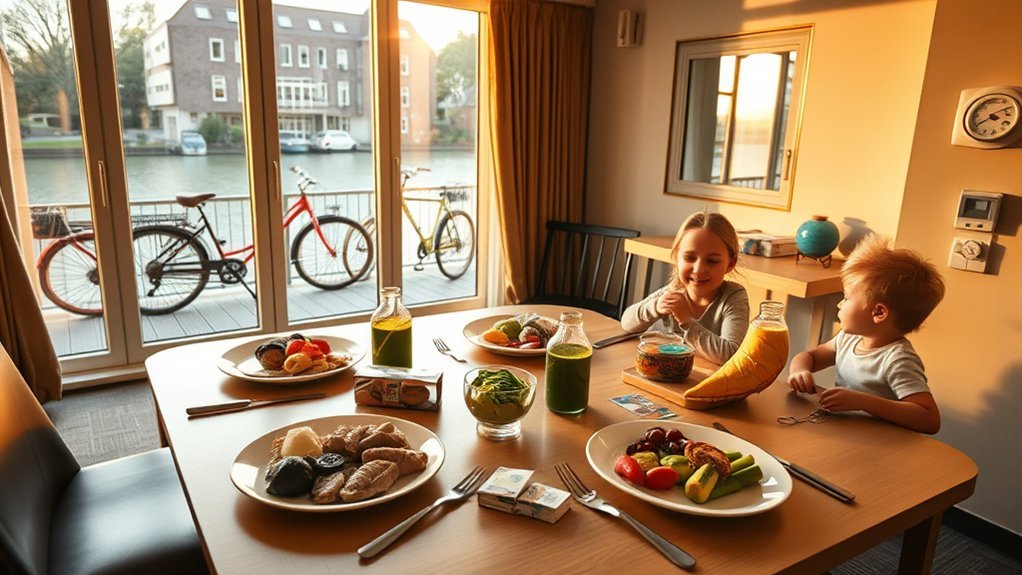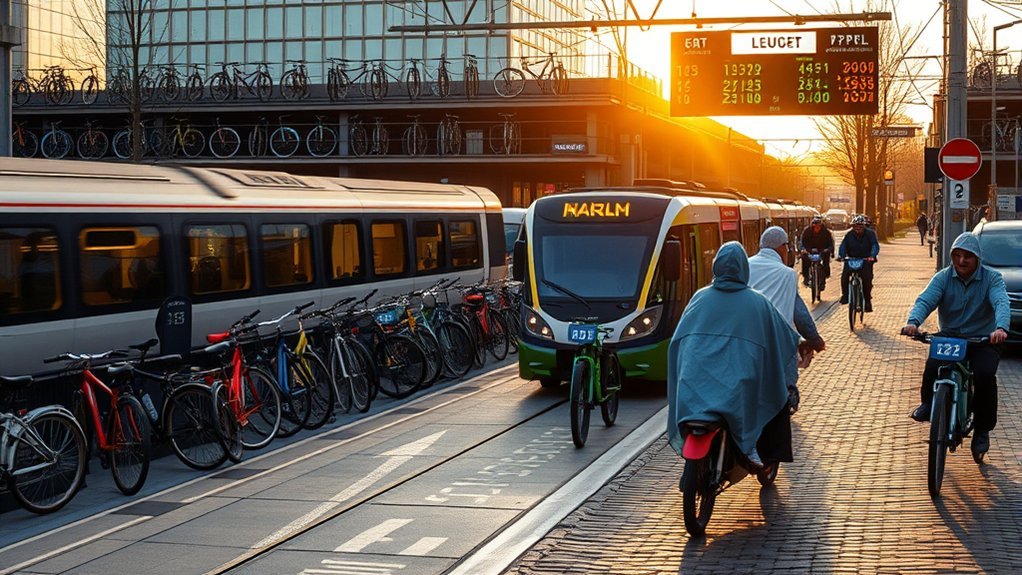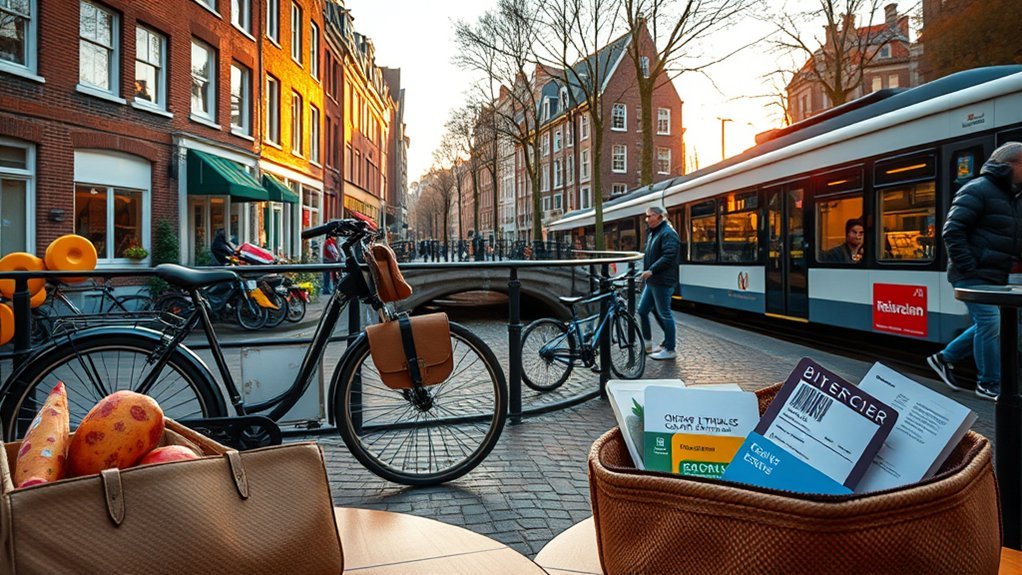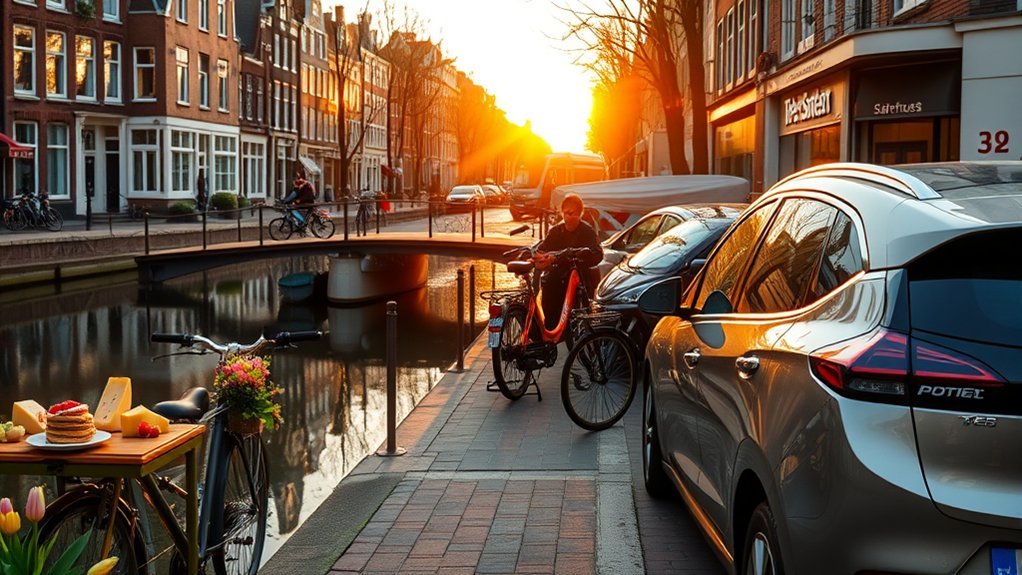You’ll typically need about €1,200–€2,000 per month as a single person, depending on city and housing; expect €3,000–€5,000 for couples and around €4,400 monthly for a family. Rent is your biggest cost—Amsterdam one-bedrooms run €1,400–€2,000—while groceries average €340 and basic health insurance about €160 monthly. Public transport passes cost €60–€107. These figures help plan budgets and savings, and there’s more detail on housing, taxes and money‑saving tips ahead.
Overview of Living Costs Across the Netherlands

Although costs vary by city and household size, you can expect a single person in the Netherlands to spend about €1,860 per month and a family around €4,430.
Expect roughly €1,860 per month for a single in the Netherlands, and about €4,430 for a family.
You’ll find the average cost of living shifts with location: major cities like Amsterdam and The Hague push housing costs higher, where one-bedroom rents commonly range €1,400–€2,000.
Your monthly expenses will include utilities (~€150) and internet (~€60), groceries and household items (~€340), and discretionary dining — dining out in Amsterdam adds roughly €330 monthly for many.
If you’re an international student, plan for monthly expenses between €1,200 and €1,800 depending on habits and city.
Transportation costs vary by commute and mode; using public transit or biking keeps costs manageable, while frequent car use raises them considerably.
Use these baseline figures to benchmark your budget choices and anticipate how city, household size, and lifestyle will alter the overall monthly spend.
Monthly Budget Breakdown for Singles, Couples, and Families

One clear way to plan is to start with per-household baselines: a single person should budget about €1,860 per month (students around €1,250), couples typically face €3,000–€5,000 depending on lifestyle and location, and families average €4,430 monthly (≈€53,160 yearly).
Use these baselines to allocate monthly expenses across categories: housing, utilities, food, transport, insurance, childcare, and discretionary spending.
For a single person, housing dominates; in Amsterdam overall monthly expenses for a single-person household can reach €3,200, while cities like The Hague are roughly 15% cheaper.
Couples can economize by sharing rent and utilities, but lifestyle choices and city determine whether they fall near €3,000 or €5,000.
Families see higher recurring costs from childcare, groceries, and insurance, which explains the €4,430 average.
Build your budget by adjusting category percentages to your location and priorities, then monitor actual spending for three months to validate and refine projected monthly expenses.
Housing and Rent: What to Expect by City

You’ll find clear differences in average rents across cities: Amsterdam one-bedrooms run about €1,600–€2,000, The Hague €1,400–€2,000, and Mustri €1,200–€1,500.
Social housing is capped at roughly €900 for incomes below €50k but often involves long waiting lists.
To lower costs, prioritize smaller towns, use local housing platforms and registration services, and apply early for social housing where eligible.
Average Rent by City
Across Dutch cities, rent for a one-bedroom apartment varies widely: Amsterdam typically runs €1,600–€2,000, The Hague about €1,400–€2,000, and Mustri around €1,200–€1,500, while smaller towns generally cost less.
You’ll find average rent figures reflect demand, location, and amenities; Amsterdam’s high prices drive overall living expenses upward.
Social housing exists for incomes under €50k, with caps near €900, but long waiting lists limit immediate access.
If you prioritize budget predictability, smaller cities and towns usually offer lower monthly rents and reduced ancillary costs.
Compare listed rents to local utilities, transport, and groceries to estimate total living expenses.
Use city-specific averages as benchmarks when planning your housing budget.
Tips for Finding Housing
Having reviewed city rent averages and social housing limits, it helps to approach your housing search with clear budget rules and local priorities.
Use the data: expect one-bedroom rents around €1,600–2,000 in Amsterdam, €1,400–2,000 in The Hague, and €1,200–1,500 in Mustri; utilities add ~€150 monthly.
Target 30–50% of take-home pay for rent in major cities and consider suburban or smaller towns to reduce housing costs.
Apply for social housing if your income is under €50,000, but factor in long waiting lists.
Prioritize proximity to public transit to save commuting time and cost.
Track listings, set automated alerts, verify total monthly costs, and budget for deposits and agency fees before signing.
Food, Groceries, and Dining Out Expenses

While groceries in the Netherlands average about €340 per month for essential household items, dining out adds roughly €330 monthly in Amsterdam where a mid-range meal for two is about €100.
Groceries average €340 monthly in the Netherlands; dining out in Amsterdam adds about €330, with mid-range meals for two near €100.
You’ll find food costs split between cooking at home and eating out: monthly grocery expenses are predictable if you shop markets or discount stores, which lowers your baseline.
Dining out varies by city; The Hague and Mustri are roughly 20% cheaper than Amsterdam, and café breakfasts cost €5–€15 while lunches run €10–€20.
Use the following to plan:
- Grocery strategy: shop local markets and discounters to reduce monthly grocery expenses below the national average.
- Dining frequency: limit mid-range dinners or choose cheaper cities to control dining out spend.
- Meal choices: single café meals or home-cooked lunches shift average meal cost considerably toward savings.
Track receipts monthly to maintain an evidence-based food budget.
Transportation and Commuting Costs

If you live in a Dutch city you can keep monthly commuting costs low by relying on public transport and bikes: a typical budget for regular riders is about €60/month, monthly passes range from roughly €60 (The Hague) to €107 (Haarlem), and one-way fares vary (about €2.75 in Haarlem and €4.40 in The Hague). You’ll find public transport reliable across major cities, so you don’t need a car for most commutes. A commuting budget of €60 covers frequent city travel; €107 is for higher-use regional routes. Biking further reduces transportation expenses—initial bike purchase ≈ €150, with similar replacement costs if stolen. Factor monthly passes, occasional single fares, and bike maintenance into your transport plan. In data terms, prioritize pass vs. pay-per-ride based on trip frequency to minimize costs.
| Option | Typical cost |
|---|---|
| Monthly pass (low) | €60 |
| Monthly pass (high) | €107 |
| One-way (Haarlem) | €2.75 |
| One-way (The Hague) | €4.40 |
Healthcare, Insurance, and Medical Expenses

You’ll need to take out mandatory basic health insurance within four months of arrival, which averages about €160/month with an €85 deductible.
Primary care and specialist access is organized through the GP gatekeeper system, but increasing wait times for mental health services can affect timely specialist referrals.
Expect about €30/month in additional out-of-pocket costs (therapy, emergency) and consider ~€30/month more for dental coverage given high dental bills.
Mandatory Health Insurance
1 key expense in the Netherlands is mandatory basic health insurance, which runs about €160 per month and typically includes an average €85 deductible.
With additional healthcare costs (therapy, emergencies) around €30 and dental insurance about €30, total monthly healthcare-related outlays exceed €200.
You’ll need health insurance by law, so factor that into your monthly budget and overall living costs.
Deductibles mean you cover initial costs; plan choices affect premiums and coverage limits.
Longer wait times for mental health services make extensive coverage more important.
Use comparison tools to assess plans against anticipated healthcare expenses and choose supplemental dental or therapy riders if you expect extra use.
Review annually to balance premium, deductible, and expected care.
- Premiums and deductible impacts
- Extra healthcare and dental costs
- Plan comparison and annual review
GP and Specialist Access
Although basic health insurance—about €160/month with an €85 deductible—covers GP visits, you’ll need to book appointments in advance and expect referrals for specialist care, which are also covered but can carry co‑payments depending on your policy.
You’ll register with a GP who manages primary care and issues referrals for specialist consultations; these referrals are generally required for reimbursements. Specialist wait times vary and can range from several weeks to months for some procedures or assessments, so plan accordingly.
Note that dental insurance is separate from health insurance, averaging around €30/month for basic plans; routine dental care is often excluded from standard coverage.
Verify your policy’s co‑payment terms and referral processes to avoid surprises.
Out-Of-Pocket Costs
Beyond registering with a GP and managing referrals, you should budget for monthly out-of-pocket healthcare costs that go beyond the base insurance premium. The average health insurance premium is about €160/month with an €85 deductible; add roughly €30/month for extra healthcare expenses (therapy, emergencies), and expect dental insurance near €30/month.
That means total healthcare expenses can exceed €200 monthly, which materially affects living in the Netherlands. Accessibility to mental health care is worsening, so delays may increase private costs.
- Base insurance: ~€160/month + €85 annual deductible impacts service use.
- Additional care: ~€30/month for therapy, emergencies; wait times may force private spending.
- Dental insurance: ~€30/month; out-of-pocket varies by treatment.
Education and Student Living Costs

When planning your budget for studying in the Netherlands, expect monthly living costs to fall between €1,200 and €1,800 depending on location and personal spending.
For education, note that public primary and secondary schools are government-funded, though you may pay for supplies and activities. Tuition fees for international and private options vary: full-time preschool/private kindergarten runs about $2,500 monthly in Haarlem and $2,020 in The Hague.
Annual international primary school fees average $6,000 in Haarlem and can reach $8,700 in The Hague. As an international student, factor these variable education costs alongside your living costs and program tuition fees if applicable.
You can reduce pressure on your budget by using part-time job opportunities widely available to students; earnings can help cover rent, food, and incidental education expenses.
Plan by comparing local tuition rates and typical monthly budgets for your chosen city to guarantee you meet both schooling and living cost requirements.
Taxes, Salaries, and Required Income Levels

When you compare gross and net pay in the Netherlands, remember the average gross salary is about €4,000 per month (€48,010 annually) but effective taxes can substantially reduce take-home pay.
Income tax is split into three boxes with Box 1 rates rising by bracket and Box 2 taxed at a flat 24.5%, so your net income depends heavily on where you fall in those brackets.
For budgeting, know that basic single living needs ~€2,000/month, families ~€5,000/month, and a comfortable lifestyle in big cities typically requires ~€60,000 annually.
Income Tax Breakdown
1 key factor in your Dutch take-home pay is the three-box income tax system: Box 1 taxes income from work and home ownership at progressive rates, Box 2 levies a 24.5% flat tax on substantial interest in companies, and Box 3 taxes savings and investments effectively at about 36%.
So a €4,000 monthly gross average (≈€48,010/year) will face different effective rates depending on the income mix and bracket, while single households typically need roughly €2,000/month and families about €5,000/month to cover living costs.
You’ll calculate taxable income differently across boxes, which affects how much of your average monthly pay covers living expenses. Consider key implications:
- Progressive Box 1 rates reduce net salary as earnings rise.
- Box 2’s 24.5% applies only to substantial corporate stakes.
- Box 3 taxes deemed returns on assets, impacting savers.
Net Vs Gross
Having seen how Boxes 1–3 shape tax liabilities, you’ll want to compare gross and net pay to understand what you actually take home. With an average gross salary near €4,000/month (€48,010/year), taxes in Boxes 1–3, plus Box 2 (24.5%) and Box 3 (36%), push effective rates high; top earners can exceed 50%, cutting net income and raising cost pressure.
| Scenario | Gross/month | Approx. net/month |
|---|---|---|
| Average earner | €4,000 | ~€2,400 |
| Single minimum comfortable | — | €2,000 |
| Family requirement | — | €5,000 |
You should match expected gross to needed net: plan for taxes, benefits, and the higher cost requirements if you’re supporting a family.
Money-Saving Tips and Practical Budget Strategies

Although living costs in the Netherlands can be high, you can cut monthly expenses by prioritizing cost-effective choices: cook at home instead of spending the typical €330/month on dining out in Amsterdam.
Although living costs in the Netherlands can be high, cooking at home saves significantly versus the typical €330/month dining out.
Use student discounts for transport and entertainment to lower the estimated €1,200–€1,800 monthly cost for international students.
Buy groceries in bulk to reduce the average €340/month on household items, and keep rent within 30–50% of take-home pay while regularly reviewing your budget to adjust for changing circumstances.
Use these practical, data-driven money-saving tips and budget strategies to maintain high quality living at a manageable cost to live.
Track recurring expenses, set targets for food, transport and utilities, and adjust when income or prices change.
Prioritize rent limits to avoid housing stress.
Combine discounts, bulk buying and meal planning to reduce variable costs.
Review your budget monthly and reallocate funds to savings or essentials when you see deviations.
- Optimize transport and entertainment with student discounts.
- Buy staples in bulk and meal plan.
- Keep rent ≤50% of net income.
Moving to the Netherlands: Relocation and Initial Setup Costs

Once you’ve tightened your monthly budget, plan for upfront relocation and setup costs that can total roughly $14,000–$21,300 for a single person; this figure typically includes shipping household goods, airfare, temporary housing, permits and initial living expenses.
When moving to the Netherlands, break down relocation expenses: international shipping for a three-bedroom home runs about $2,256–$4,759 depending on method, and a one-way airline ticket typically costs $400–$800.
You should obtain at least three quotes for moving services to compare pricing and reduce unexpected charges. Include temporary housing, deposits, utility hookups and basic furnishings in your initial setup costs.
Factor the residence permit application fee (around $178.05) and note that securing employment often streamlines immigration and housing access.
Budget a contingency of 10–20% for unforeseen costs. By itemizing shipping, travel, temporary accommodation, permits and start-up living expenses, you’ll get a realistic, data-driven estimate for relocating to the Netherlands.
Frequently Asked Questions
How Much Does It Cost to Live in the Netherlands in US Dollars?
You’ll pay about $1,980 per month on average as a single person in the Netherlands. Rent varies—$1,600–$2,000 in Amsterdam, $1,400–$2,000 in The Hague—plus utilities (~$160) and internet (~$65).
Can a US Citizen Live in the Netherlands?
You’re welcome to live in the Netherlands if you secure a residence permit; it’s not a cakewalk. You’ll need a job or sufficient funds, pay application fees (about $178; permanent around $224.68), and meet standard requirements.
How Much Money Do You Need to Live Comfortably in the Netherlands?
You’ll need about €2,000 monthly (≈€24,000 annually) as a single person to live comfortably; families typically need around €5,000 monthly (≈€60,000 annually). Housing in big cities pushes costs higher, especially Amsterdam.
What Is the Average Rent in the Netherlands?
Steady statistics: you’ll usually pay about €1,200–€2,000 monthly for a one‑bedroom. City centers like Amsterdam push prices toward €1,600–€2,000, smaller cities around €1,200–€1,500, social housing caps near €900.
Conclusion
You’ll find costs vary like Dutch weather—unpredictable but measurable. Think of rent: Amsterdam averages €1,600 for a one‑bed, while smaller cities drop below €900; that gap is your umbrella. If you earn €3,000 net, you’ll cover essentials but not luxury; families often need €4,500–€6,000. Use public transit and shop weekly to cut food bills. With planning and local data, you’ll balance comfort and cost without surprises.


